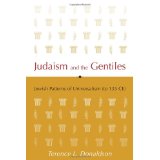[First posted August 28, 2012.—Admin1]
Terence Donaldson is the author of several books:
Paul and the Gentiles: Remapping the Apostle’s Convictional World
- Jews and Anti-Judaism in the New Testament: Decision Points and Divergent Interpretations
Religious Rivalries and the Struggle for Success in Caesarea Maritima (Studies in Christianity and Judaism)
Jesus on the Mountain: A Study in Matthean Theology (Journal for the Study of the New Testament Supplement Series 8)
Judaism and the Gentiles: Jewish Patterns of Universalism (to 135 CE)
The last one is what we are featuring here as MUST READ:
Sub-title: Jewish Patterns of Universalism (to 135 CE
Author: Terence L Donaldson (Christian perspective)
Contents
1. Introduction
PART I: Texts and Commentary
2. Scripture, Septuagint and Apocrypha
3. Pseudepigrapha
4. Qumran
5. Philo
6. Josephus
7. Greco-Roman Literature
8. Early Christian Literature
9. Inscriptions
PART II: Patterns of Universalism
10. Sympathization
11. Conversion
12. Ethical Monotheism
13. Participation in Eschatological Salvation
14. Conclusion
[Here are some excerpts from the Introduction to give you an idea of what to expect from this book, available as ebook at amazon.com]
- Jews everywhere identified themselves with reference to the biblical narrative, a narrative in which the cosmic and universal is oddly intertwined with the national and particular.
- On one hand, Jews understood their God to be one, universal deity, a God who had created the whole world and who continued to exercise sovereignty over the created order and all the nations within it.
- On the other Jews believed that this God had chosen them out of all the nations of the world to be a special people; that the will and the ways of this God had been revealed uniquely in Israel’s scripture; that the God who had created the cosmos was nevertheless uniquely present in the Jerusalem temple; and that despite the Jews’ temporal misfortunes, eventually Israel would be vindicated and exalted to a position of prominence over all other nations.
- Jews could not tell their own national story without reference to the other nations, and if perhaps it was possible to narrate the story in such a way that the nations functioned simply as a foil for Israel, the story itself contained at least latent questions about the relationship between these other nations and the God who had created them.
- In addition to this intrinsic factor, several other factors of a more extrinsic character tended to force these latent questions out into the open.
- One of them was Israel’s actual experience, which in various ways forced them to negotiate emergent tensions between their self-identifying story, in which the nations played their assigned roles, and their ongoing encounters with non-Jewish people and nations
- This was especially the case in the diaspora, where Jews interacted daily with their non-Jewish neighbours and where Jewish communities in many cases have achieved a comfortable modus vivendi in the midst of Gentile cities.
- To the extent that these interactions were positive, as they often were, Jews were prompted to ask whether and on what terms Gentiles might come into a positive relationship with Israel’s God.
- And even when their actual experiences with Gentile nations were more painful and distressing, many Jews could not help but dream of an ideal or future world in which Gentiles might recognize the truth and, in one way or another, come to worship the God of Israel.
- More important here is the phenomenon of Gentile attraction to Judaism.
- Many Gentiles found Jewish belief, practice and communal life to be very appealing; and not a few of them were prepared, to greater or lesser extents, to adopt Jewish ways and to attach themselves to the Jewish community.
- .Although Israel’s self-defining story could not be told without manifold reference to the nations, the story itself provided no normative indication of their religious status and, more specifically, of how they might enter into a positive relationship with Israel’s God.
- Israel’s religion was restricted to members of the ethnos Israel; the only way in which a person could become part of the Israel was by birth.
- The idea of conversion or proselytism, which became such a significant factor in the Greco-Roman period, was simply not a conceivable option.
- Still, the idea of proselytism when it did develop was significantly influenced by a biblical model, that of the resident alien, who was incorporated into the social and religious life of Israel in significant ways.
- This is one instance of several ways in which Israel’s scripture provided raw material for attempts to deal with the question of the Gentiles and their religious status. . . . .”universalism” tends to refer to approaches that ascribe legitimay to the religious “other” without requiring conversion.
- A religion in which conversion is the only option is particularlistic rather than universalistic.
- “Gentiles” — the term derives from the Latin gens, nation, and receives its sense of “non-Jew” from the fact that in biblical tradition “nations” was commonly used to refer to the nations other than Israel.
- In time the term came to apply not only to non-Jewish nations but also to individuals.
- The term is thus one that has meaning only in a Jewish frame of reference.
- Non-Jews would not ordinarily think of themselves as “Gentiles,” unless they were associated in some way with the Jewish world. . . . “Gentile” is to be seen as a term of convenience. It is not inappropriate, in that it derives from Jewish usage. But this sense of the term was restricted to the linguistic world of the Jews and, even there, existed alongside other terms.

